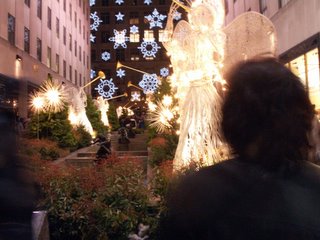Two adults fight over the custody of a cat. Ayyy New York. This makes me think of something John Leland wrote in the introduction to
Hip: A History, "Poor societies worry about growing enough corn; rich societies can worry about being corny."
I think they should let the cat decide. I mean isn't he about 35 years old in human years? He's a grown cat; he knows what he wants. I say if he's old enough to get another feline pregnant, has a whole court full of idiots wasting taxpayers' money, occupying much needed court time, then why shouldn't we entertain a judge meeting with the cat in question? On the other hand, if the biological mother or siblings turn up and petition as well, then it's a whole new bag of catnip...
"The Furry, 4-Legged Centerpiece of a Custody Battle in Court"
By
ANEMONA HARTOCOLLISPublished: December 15, 2005
When Chavisa Woods, then an aspiring poet and a college student, found Oliver, he was a 6-month-old kitten and had just been thrown from a car.
Four years later, in September 2004, he walked out of his home, and became the center of a custody battle that has wended its way through State Supreme Court in Manhattan for months.
He has even prompted serious questions about a New York City law on the books for more than 100 years.
Oliver, who Ms. Woods said is a Russian blue, was picked up by a neighborhood animal lover, turned over to an animal rescue agency authorized by the city and almost immediately adopted. But Ms. Woods wants him back.
Last week, Justice Marylin G. Diamond decided to hold a full trial in the case to determine whether Oliver, who is now known as Gatsby, should be returned to his earlier home or be allowed to stay with a woman identified, as many adoptive parents are, only as Jane Doe.
Although the case might seem trivial in an austere stone courthouse where weighty issues are decided every day, it could be important to the vast system in New York that handles tens of thousands of stray and lost pets, mostly dogs and cats, every year.
Ms. Woods is challenging a 111-year-old city law that terminates the rights of pet owners 48 hours after an animal disappears. In a victory for Ms. Woods, Justice Diamond has ruled that the 48-hour clock should not be started until a lost pet has been listed in a city registry of lost animals. Whether Oliver/Gatsby was ever listed in the registry is in dispute, and remains to be determined during the trial, which could take place in January.
The ruling has alarmed animal rights advocates, who fear that it will overturn thousands of adoptions that have already taken place, and that it may make animal rights groups vulnerable to lawsuits.
Michael Goldberg, Jane Doe's lawyer, protested yesterday that the judge was going beyond the scope of the 1894 law by requiring pets to be registered in a database.
Referring to rescue agencies, he said: "They will be scared out of their minds. God forbid they don't register someone on the registry; if they put the pet up for adoption maybe they're liable. And even worse, if it's euthanized maybe they're liable."
If Ms. Woods wins her case, he said, people might hesitate to adopt animals for fear of having to return them if the original owners surface.
The 1894 law, called the New York City Dog License Law, says that a pet owner's right to reclaim a lost pet is terminated if the animal is not claimed within 48 hours of being seized by an authorized city agency.
"It was very simple," Mr. Goldberg said. "If you lost your pet and Animal Care and Control got them, the owner's rights were terminated unless the owner made a claim within 48 hours. It didn't spell out how you could make a claim."
But Donald N. David, a lawyer for Ms. Woods, said the judge's ruling recognized that his client had a right to be notified before her pet was taken. "The statute remains exactly the same," he said. "They now have some definitive point when the clock starts to tick. It sounds horrible, but our society treats animals as if they are chattel, so there is a due process requirement for taking the animal."
Ms. Woods is not impressed by the legal issues. "The fact that it's become a seminal case kind of infuriates me," she said yesterday, "because it's taking so much longer and all I want is my cat back."
Ms. Woods, 23, said she thought about Oliver every day. "He was like my shadow cat, constantly around me," she said. "I see other people's cats, it hurts." She is now living upstate, in Hudson, struggling to make it as a poet while working in a wine store.
Oliver/Gatsby's new owner declined, through her lawyer, to be interviewed. All that is known about Jane Doe is that she is a lawyer, according to Ms. Woods's lawyer, and that she adopted Oliver/Gatsby through Kitty Kind, a nonprofit animal shelter that operates in the Petco store in Union Square.
But her lawyer said that Jane Doe was a cat lover, and that Oliver/Gatsby has never been happier. "She provides for the cat," he said. "The cat is thrilled with her."
Through an exchange of photographs ordered by the court last spring, Ms. Doe and Ms. Woods confirmed that Oliver and Gatsby are indeed the same cat. But Ms. Doe has said in court papers that she bonded with the cat and did not want to part with him. Besides, her lawyer said, she believes that Oliver/Gatsby was not well cared for by Ms. Woods, and that the cat's escape was proof of that.
Ms. Woods said she was not home when the cat walked out. Oliver slipped out, she said, because her roommate at the time, a blind poet, had not noticed that a visitor had left the door open.
When she returned home, she said, she began looking for the cat right away. "I was gone for one night," she said.



















